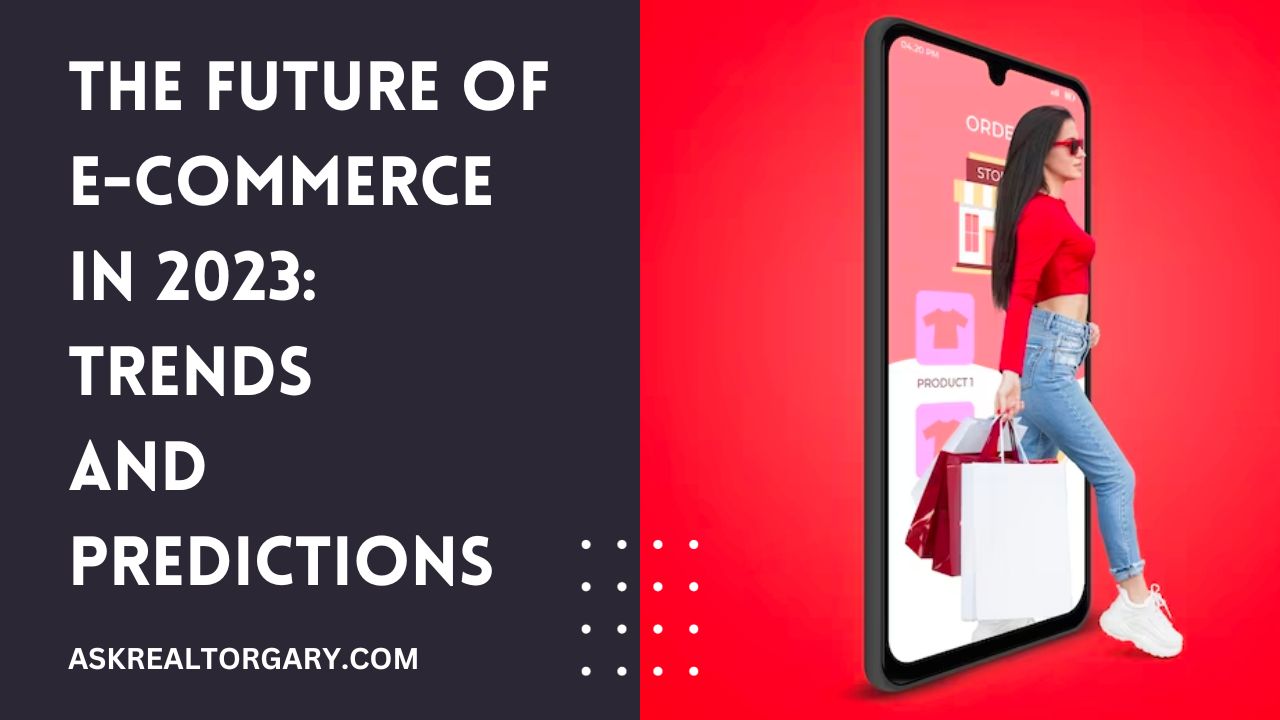In the constantly shifting terrain of e-commerce, the ability to foresee and adapt to emerging trends is indispensable for businesses aiming not just to survive but to excel. As we embark on the journey into 2023, the e-commerce domain continues its rapid evolution, driven by technological advancements, shifting consumer behaviors, and dynamic market trends. In this comprehensive exploration, we venture into the intricate tapestry of the future of e-commerce, dissecting key trends, and making profound predictions to serve as a guiding compass for businesses operating within the fiercely competitive digital marketplace.

The seismic shifts in how individuals interact, transact, and perceive the digital shopping experience underscore the necessity for businesses to recalibrate their strategies in tandem with these transformative currents. The year 2023 promises to be a pivotal juncture, marking the emergence of pioneering trends that promise to redefine the landscape of online retailing.
Contents
- 1 Rise of Augmented Reality Shopping Experiences
- 2 The Role of Artificial Intelligence in Personalized Shopping
- 3 Integration of Voice Commerce
- 4 Sustainability and Ethical E-Commerce Practices\
- 5 Enhanced Payment Solutions and Cryptocurrency Integration
- 6 The Evolution of Social Commerce
- 7 Hyper-Personalization Through Predictive Analytics
- 8 Evolution of Delivery and Fulfillment Services
- 9 The Influence of 5G Technology on E-Commerce
- 10 Virtual Reality (VR) Integration in Shopping Experiences
- 11 Conclusion
Rise of Augmented Reality Shopping Experiences
One of the most transformative trends poised to reshape the e-commerce landscape in 2023 is the widespread adoption of augmented reality (AR) in shopping experiences. With the integration of AR technologies, online retailers can offer customers a more immersive and interactive way to explore products virtually. Imagine trying on clothes or visualizing furniture in your living space before making a purchase decision. This not only enhances the overall customer journey but also reduces the likelihood of returns, leading to increased customer satisfaction.
The incorporation of AR into e-commerce platforms is not limited to just visualizing products. We anticipate an expansion into virtual trial rooms for cosmetics and accessories, providing consumers with a comprehensive understanding of how products will fit into their lives. Retailers investing in AR technologies position themselves at the forefront of innovation, offering a competitive edge in a market where customer experience is paramount.
The Role of Artificial Intelligence in Personalized Shopping
Artificial Intelligence (AI) is set to play a pivotal role in shaping the future of e-commerce by revolutionizing personalized shopping experiences. As AI algorithms become more sophisticated, businesses can leverage data analytics to understand customer preferences, behavior, and purchasing patterns. This enables the delivery of highly targeted and personalized recommendations, creating a more engaging and tailored shopping experience.
In 2023, expect to see AI-driven chatbots and virtual assistants becoming integral components of e-commerce platforms. These intelligent assistants can assist customers in real-time, providing product recommendations, answering queries, and guiding them through the purchasing process. The result is not only an improved customer experience but also increased efficiency for businesses in managing customer interactions.
Integration of Voice Commerce
With the proliferation of voice-activated devices, voice commerce is set to become a prominent trend in the future of e-commerce. Consumers are increasingly turning to voice assistants like Amazon’s Alexa and Google Assistant to search for products, place orders, and track deliveries. E-commerce platforms that integrate seamlessly with these voice-activated devices stand to capture a growing market of consumers seeking a convenient and hands-free shopping experience.
Also Read –
- The Psychology Behind Online Shopping: What Drives Consumers in 2023
- Online Shopping Safety in 2023: Tips and Best Practices
Key players in the e-commerce industry are investing heavily in optimizing their platforms for voice search, recognizing its potential to revolutionize the way consumers interact with online stores. As we move further into 2023, businesses should prioritize voice commerce integration to stay competitive and meet the evolving preferences of tech-savvy consumers.
Sustainability and Ethical E-Commerce Practices\
In the future of e-commerce, sustainability and ethical practices are expected to take center stage as consumers become increasingly conscientious about the environmental and social impact of their purchases. Businesses that align with sustainable practices not only contribute to global efforts for a greener future but also appeal to a growing segment of environmentally conscious consumers.
To cater to this demand, e-commerce platforms are expected to prioritize transparency in the supply chain, offering detailed information about the sourcing and production processes of products. Brands that embrace eco-friendly packaging, ethical labor practices, and overall sustainability will build a positive brand image and establish long-term relationships with mindful consumers.
Enhanced Payment Solutions and Cryptocurrency Integration
In the ever-evolving landscape of digital transactions, the future of e-commerce will witness a surge in enhanced payment solutions and the integration of cryptocurrencies. As traditional payment methods continue to coexist with digital wallets and contactless payments, businesses must adapt to provide a seamless and secure transaction experience for their customers.
Cryptocurrencies, especially Bitcoin and Ethereum, are gaining traction as viable payment options. E-commerce platforms that embrace cryptocurrency transactions offer consumers an alternative and secure method of payment, tapping into a tech-savvy audience that values financial privacy and decentralization. In 2023, expect to see a significant increase in the adoption of cryptocurrencies as a mainstream payment method, reshaping the way we perceive and conduct online transactions.
The Evolution of Social Commerce
Social commerce is poised to undergo a significant evolution in 2023, blurring the lines between social media platforms and online shopping. With the integration of shopping features directly into social media channels, users can seamlessly discover, explore, and purchase products without leaving their favorite platforms. This trend capitalizes on the impulsive nature of social media users, turning product discovery into a social experience.
Platforms like Instagram and Facebook are at the forefront of this transformation, introducing shoppable posts, live shopping events, and interactive features that facilitate direct transactions. E-commerce businesses looking to stay relevant should invest in robust social commerce strategies, leveraging the power of influencers and user-generated content to drive engagement and sales.
Hyper-Personalization Through Predictive Analytics
The application of predictive analytics in e-commerce is evolving rapidly. Businesses are leveraging advanced algorithms to analyze user behavior, purchase history, and contextual data to predict what customers might want before they even realize it. By understanding and interpreting these patterns, companies can offer highly personalized product recommendations, curated content, and tailored marketing strategies.
Predictive analytics is not only shaping individual customer experiences but also aiding businesses in inventory management and strategic decision-making. This level of hyper-personalization elevates the customer journey, fostering stronger relationships between consumers and brands based on an intimate understanding of their needs and desires.
Evolution of Delivery and Fulfillment Services
The last-mile delivery aspect of e-commerce continues to undergo transformation. Innovations in delivery methods, such as drone and autonomous vehicle technologies, promise faster and more efficient delivery, especially in urban areas. Moreover, the focus on sustainability is driving initiatives for eco-friendly packaging and reduced emissions in transportation.
Companies are investing in greener logistics solutions to meet consumer expectations for sustainable practices. Beyond speed, the emphasis is now on creating an environmentally conscious and reliable delivery network, aiming to reduce the carbon footprint while ensuring timely and secure deliveries.
The Influence of 5G Technology on E-Commerce
The implementation of 5G technology in e-commerce is poised to revolutionize the digital landscape. With significantly enhanced network speeds and reduced latency, 5G will enable more immersive and interactive online experiences. For instance, live streaming of product launches, high-definition visuals, and seamless browsing on mobile devices will become the norm.
This technology’s potential for faster and more reliable connections will open doors for more engaging content, such as augmented reality experiences and real-time product interactions. E-commerce platforms that optimize for 5G capabilities will cater to a growing audience demanding instant and high-quality interactions, ultimately enhancing user engagement and satisfaction.
Virtual Reality (VR) Integration in Shopping Experiences
While augmented reality continues to gain traction, the integration of virtual reality in e-commerce is an upcoming frontier that promises a whole new level of immersive shopping experiences. VR enables customers to step into virtual stores, interact with products in a simulated environment, and even ‘try before they buy.’ This technology will significantly impact industries like real estate and high-end retail, allowing consumers to experience properties or luxury items in a virtual space, enhancing their understanding and connection with the products.
As VR technology advances, it will provide a unique and almost lifelike shopping encounter, offering a novel way for customers to explore and engage with products, potentially reducing return rates by providing a more accurate representation of the merchandise.

Conclusion
As we navigate the intricate landscape of the future of e-commerce in 2023, businesses must adapt to emerging trends to stay competitive and meet the evolving needs of consumers. From the immersive experiences offered by augmented reality to the convenience of voice commerce and the ethical considerations of sustainability, the e-commerce landscape is a dynamic and ever-evolving space.
By embracing the transformative power of technology and aligning with consumer values, businesses can position themselves for success in a digital marketplace that rewards innovation and customer-centric approaches. The future of e-commerce is not just a destination; it’s a journey of continuous adaptation and evolution, and those who navigate it with foresight and agility will thrive in the years to come.










